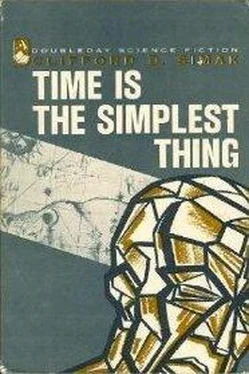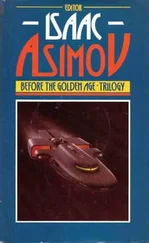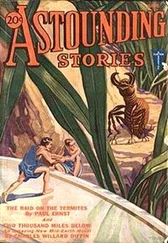He felt human, he told himself — yet how was he to judge? For he still would be himself if he were entirely alien. Human, half human, or not human in the slightest, he still would be himself. He’d scarcely know the difference. There was no other outside point from which he could stand and judge himself with anything like objectivity.
He (or whatever he might be) had known in a time of terror and of panic how to slip into the past, and it stood to reason that, knowing that, he likewise should know how to slide back into the present, or what had been his present — back to that point in time, whatever one might call it, where life was possible.
But the hard, cold fact was there: He had no idea of how it might be done!
He looked about him, at the antiseptic coldness of the moonlight-painted land, and a shudder started at the core of him. He tried to stop the shudder, for he recognized it as the prelude to unreasoned terror, but the shudder would not stop.
He gritted mental teeth, and the shudder kept on growing and suddenly he knew — with one corner of his mind, he knew.
Then there was the sound of wind blowing in the cotton-woods — and there’d been no cottonwoods before. Something, too, had happened to the shudder, for it was there no longer. He was himself again.
There were insects fiddling stridently somewhere in the grass and bushes, and there were flecks of light moving in the night to betray the lightning bug. And through the shuttered window of the house up on the hill came thin, strangled shafts of light.
He turned off the road and walked down into the stream bed, stepped through the foot-deep water and up the other bank among the cottonwoods.
He was back again, back where he’d started from. He’d come from past to present and he’d done it by himself. For a fleeting moment, at the very end of it, he had caught the method, but it had slipped from him again and he did not know it now.
But that did not matter. He was safely home.
He woke before morning light, when the birds first began to chirp, and made his way up the hill to the garden patch just below the house. He got three ears of corn, he dug into a hill of potatoes, he dug up a butcher plant and noted with some satisfaction that it had four steaks upon it.
Back in the grove of cottonwoods, he searched through his pockets until he found the book of matches the sheriff had let him keep of all the stuff he had. He flipped back the cover and saw there were three matches left.
Regarding the three matches gravely, he thought of that day long ago when he had to pass a Boy Scout test by the lighting of a fire with a single match. Was he that good now? he wondered, chuckling at the thought.
He found a dead tree trunk and dug into the heart of it to get punk that was powder-dry. He selected dead, dry twigs. He rustled up some bigger wood, still paying close attention to its dryness, for the fire must be as smokeless as it was possible to make it. There was every reason he should not advertise his presence.
On the road above him the first car of the day went past, and far off a cow was bellowing.
The fire started on the second match, and he nursed it carefully, building it bit by bit with the adding of more twigs and finally larger twigs until there came a time when he could put on some of the bigger wood. The fire burned clear and smokeless, and he sat down beside it to wait for it to burn into a bed of coals.
The sun was not yet up; but the light in the east was growing brighter and there was a coolness on the land. Below him the creek ran chattering across its bed of pebbles.
Blaine drew in a deep breath of the morning air and it tasted good.
He was still alive and in the land of other people and he had food to put into his belly — but what did he do next? He had no money — he had nothing but a single match and the clothes he stood in. And he had a mind that would betray him — a mind, the old crone had said, that would bounce back at you. He would be a sitting duck for any peeper, any spotter, that should chance across him.
He could hide by day and walk by night, for it would be safe to be abroad at night when others kept inside. He could raid orchards and gardens for his food. He could keep alive and make a few miles every night, but it would be slow going.
There must, he told himself, be some other way.
He put more wood on the fire and it still burned bright without any smoke. He went down to the stream and lay flat upon his belly and drank from the singing water.
Had he been mistaken, he asked himself, to run away from Fishhook? No matter what had awaited him in Fishhook, the situation in which he now found himself probably was worse. For he was a fugitive now from everyone; there was no one he could trust.
He lay staring down into the stream bed, looking at the pebbles — looking at one pebble, a red one that gleamed like polished ruby. He took the pebble into his mind and he saw what it was made of and the structure of its crystals and he knew where it had come from and he could trace its wanderings through millenia.
Then he tossed it from his mind and took in another pebble, a shiny bit of quartz -
There was something wrong here!
This was something he’d never done before!
And yet he had been doing it as if it were a commonplace performance and nothing at which one should even wonder.
He pushed his body up and hunkered by the stream, his human sense aghast, but still not entirely startled — for he was still himself, no matter what he was.
He sought the alienness again and it wasn’t there; it did not reveal itself, but he knew that it was there. It still was there, he knew, with its grab bag of senseless memories, with its cockeyed abilities, with its crazy logic and its topsy-turvy values.
In his mind’s eye he saw a strange parade of purple geometric figures lurching across a desert of pure gold, with a blood-red sun hanging in a sulfur sky and nothing else in sight. And in the fleetness of that moment he knew the location of the place and the meaning of it and the coordinates of a fantastic cosmographic system that could get him there. Then it all was gone — the figures and the knowledge.
He got slowly to his feet and went back to the fire and by this time there was a bed of coals. He found a stick and scratched out a hollow in the coals and put in the potatoes and the corn, still wrapped in its husks, and used the stick to scratch the coals back across the hollow. Breaking a green branch off a sapling, he used it as a fork to broil one of the steaks.
Squatted beside the fire, with the warmth of it upon his face and hands, he felt a smug contentment that seemed strangely out of place — the contentment of a man who had reduced his needs to the strictly basic — and with the contentment came a full-bodied confidence that was just as out of place. It seemed almost as if he could look ahead and see that everything would be all right. But it was not prescience. There were hunchers who had prescience or who seemed to have it, but he was not one of them. It was rather as if he could sense ahead of him the pattern of all rightness, but with no specific detail, with no idea of the future’s shape, nor of its direction. An assurance only, something that was akin to plain, old-fashioned hunch, a feeling for the future — but nothing more than that.
The steak was sizzling and he could smell the potato baking and he grinned at steak and baked potato as a breakfast menu. Although it was all right. There was nothing at the moment that was not all right.
He remembered Dalton slumped spineless in the chair, with the clenched cigar and the brush-pile hair, raging at the butcher plant as another outrage committed upon the businessman by the maliciousness of Fishhook. And he tried to recall from what planet of which sun the butcher plant had come and the name, it seemed to him, should be at his command, although he could not put it on his tongue.
Читать дальше








